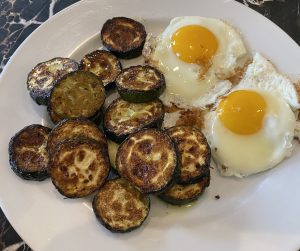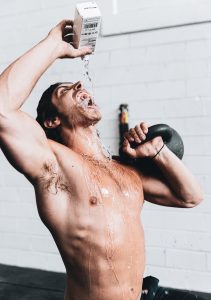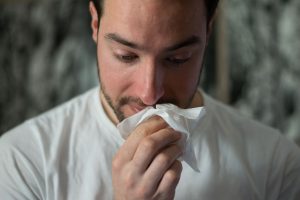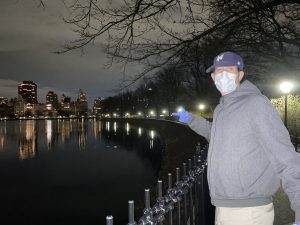Herbal Medicine
Breakfast Idea: Eastern Nutrition

Patients often ask me what they should eat for breakfast. Most Americans are conditioned to either skip breakfast, have something simple and unhealthy like a bagel or toast, or something “healthy” like yogurt or smoothies. While the latter might check off as such within the context of a scientific laboratory, obviously Eastern Medicines hold that uncooked foods are more difficult to digest, thereby ultimately providing us with less nutrients, in spite of having maybe started with more on the grocery shelf.
While going through Chinese Medical school my own microbiome was a minor disaster, and one of my teachers who was treating me at the time requested I eat sweet potatoes (with my eggs) for breakfast.
“You want me to eat Thanksgiving for breakfast?” I asked. He laughed and asked if I’d ever had eggs with hash browns or french fries. Of course I had, countless times.
He rhetorically asked me what the difference was —if I chopped sweet potatoes in the same way as hash browns, even adding onions to my liking. For years to follow sweet potatoes became my daily breakfast. And many of my health issues gradually improved during that time.
I became perpetually more educated in health and self-care, also about food itself. I learned that sweet potatoes are not in season for the majority of the year, which means during those periods they are, a) not as much what my body needs, and b) likely lacking in their maximum nutrients. From yams it was an easy transition to exploring other vegetables as side dishes with breakfast, which I realized was a good way to get in some daily recommended portions of greens from the start.
For many years now my breakfast has been eggs with a cooked, in-season vegetable, and would struggle to imagine starting the day any other way. In the Winter we eat a variety of root vegetables—whether roasted potatoes, carrots, radishes, or turnips—in Summer it’s more leafy greens. As for the ongoing, raging egg debate, now reignited by many functional medicine docs, all I can say is I’ve eaten eggs every single day for decades. I don’t doubt some peoples’ allergies to them, in which case they should surely avoid until that allergy is rectified. For the rest of us eggs provide invaluable nutrients in a very light, easily metabolized way. In Chinese Medicine they are said to nourish the blood, so much so that the yolk is even an ingredient in the herbal formula, “Huang Lian E Jiao Tang,” which is used to clear inflammatory heat that exists as a result of healthy systemic fluid deficiency. This “blood” benefit is probably why eggs are so highly recommended by many holistic fertility doctors.
EGGS AND “ZUCCH” (as my daughter calls it)
- Pre-heat oven to 375
- Slice squash however you like it, leave all of the slices on the cutting board, and lightly sprinkle them with salt. Let them rest for about 10 minutes (or longer) so that their excess water gets sweated out, then pat them dry.
- Add to pan with olive oil, sprinkle with salt, pepper, and whatever seasonings you like.
- Cook for 15-20 minutes, turning them over once in the middle to roast both sides
- Once almost finished cook your eggs to your liking.
- Drizzle a nice olive oil on top of them once plated
Thirst, Sweat, & Urine: What is Normal?

In contrast to the requisite ruling out of red flags by most nurses in conventional medical settings, the reason Chinese Medical practitioners ask about almost every system in your body is because we are diagnosing based on complete patterns—not just symptoms.
For example, if someone comes in for acid reflux, we cannot know their prescriptions until we know how often they urinate or poop, what each one is like, whether they experience headaches or dizziness, which part of the head they get their headaches in, how is their appetite, how thirsty they are during the day versus in the evening, etc. etc. This is because we are one of the only true forms of holistic medicine.
So, what is normal?
A normal amount of urination is approximately 6 times a day (yes, this includes waking at night). Much less than that and you are likely either retaining, or not drinking enough water in the first place. More than 6 indicates either a weakness in the urogenital microbiome, or excessive inflammation in the urogenital microbiome, which over time can lead to local weakness by putting strain on it. The remainder of the intake questions will determine which of the two is the case.
People should sweat, but not excessively so. Chinese Medicine is critical of HIIT or marathon training, hot yoga, and sauna therapy in most cases. While these might all feel great in the short-term and/or be proven to offer certain isolated benefits in the short-term, we believe they ultimately deplete the body’s healthy metabolic fluids. On the other hand, never sweating (exercising) at all is obviously just as harmful.
While some people barely break a sweat even when they exercise, others are drenched by the time they finish their morning commute, especially triggered by certain climates or seasons. The former can either indicate body fluid depletion or a malfunction of the immunological “qi.” The latter can either indicate inflammation, fluid retention, or also a malfunction of the immunological “qi.” This is where diagnoses and prescriptions get tricky.
Many western doctors have now begun to recognize the health benefits of the Chinese herb, astragalus, which on one hand is great. On the other hand, their recognition by way of empirical studies poses the challenge of having no comprehension of Chinese Medicine. If you give astragalus to the former example of a “cold-body person” with a simple immunological malfunction they will feel amazing and sing your praises. If you give it to someone with both immunological malfunction AND fluid deficiency it will do almost nothing. Worse, if you give it to a “hot-body person” with inflammation and fluid retention they will feel much worse.
Finally, it is normal to be thirsty, for 6-9 cups of water per day. A lack of thirst tells us there is fluid retention in the microbiome, signaling to the brain that it’s got plenty of liquid down here—no need to hydrate! This is dangerous, and better to fake it ‘til you make it in acquiring thirst. On the other pole are those who are ravenously or insatiably thirsty, which informs us of inflammatory heat in either their respiratory microbiome, gastrointestinal microbiome, or both, drying out their fluids. As always, the most complicated patterns are those who are generally unthirsty followed by sudden bouts of desperate thirst. This is a combination pattern that requires more thought, trial, and error.
I hope this was interesting and informative. One of western medicine’s shortcomings is its reliance on tests and labs to determine whether we are healthy or normal. While these are undeniably valuable, they tell only part of the story, which is why so many diseases get caught too late. Chinese Medicine is more brilliant in its neurotic recognition of pathologies in any abnormality, any imbalance, as something to rectify before it spirals into disease.
Refuting the “Man Cold” Cliche

Well, if Covid and seasonal allergies had a lovechild its name would apparently be the upper respiratory pathogens of Winter, 2023. I experienced both personally and professionally, not only the severity of these viruses’ symptoms, but maybe even more troubling was how stubborn they were to resolve. Coughs that would linger for weeks on end, allergies turned to sinus infections, and one friend had the shingles virus transform into a vicious cough, which in my humble opinion occurred because he didn’t properly treat the former with Chinese Medicine.
I am grateful we seem to be passing simultaneously, likely not coincidentally, out of this post-pandemic ripple effect along with the cold weather. Besides dilating the blood vessels of our respiratory microbiomes, thereby giving pathogens wider exit pathways, the warm air should eventually aid in transforming latent mucus and boosting our metabolic energies enough to in turn boost our immunological energies, or “wei qi.”
I plead ignorance, in the past few years more than ever, to most current events, trends on social media, philosophical platitudes, and pop culture; and I often question whether that makes me an “ignorant person”—especially since we will all eventually die still relatively ignorant about most things and peoples. Besides my family, I devote most of my time and mental energy to Chinese Medicine. Whatever is left over at the end of each day are mere scraps, an hour or two at most, and I choose to shut my mind off with friends and/or sports. Maybe in another chapter of my life I’ll read more articles and keep up with external themes and events.
Before blowing my own nose about 50 times a day one week back in January, my lungs exacerbated by the need to rid themselves of phlegm, I had never heard of “the man cold.” Apparently, amongst the infinite social media cliches is one that guys are overly dramatic or whiney about their common colds, obviously underscoring “girl power,” which is a great thing, but also the idea that men are weak(er), which might not be great, or accurate.
Recall the first wave of Covid, we were quickly informed that men, along with the elderly and obese, were most susceptible to severe infections. Why? Well, from a Chinese Medical perspective men have more heat and/or yang qi in the body’s upper region. On one hand it is why we are fortunate enough to have generally more energy. It is consistent with our generally superior upper body strength; though it is also why the inflammatory cytokine response is more intense in the context of upper respiratory viruses.
If you require this be translated in conventional medical terms—and most westerners do—as a result of our increased testosterone and androgens, men possess higher numbers of T cells and Natural Killer cells than women, whereas women have greater B cells, neutrophils and phagocytic activity, which makes them more adept at clearing viruses, as well as the toxins from vaccines. Women also have a greater susceptibility to dysregulation of innate lymphoid cells, which makes them generally more prone to autoimmune disease. (source: https://www.nature.com/articles/nri.2016.90.pdf)
Returning to the brilliant simplicity of Chinese Medical jargon: It is the heat from our body’s (masculine) yang qi that provides ample metabolic strength to regulate our lymphoid cells and avoid autoimmune disease. It is that same heat, left uncontrolled, that creates a more inflammatory cytokine storm in the lungs and makes clearing external pathogens more stubborn. It’s not because your husband is being a little bitch.
Spring Season and Moving Day!

Despite the northeast weather forecasts consistently looking more like a frightening EKG than a directly corresponding line with the seasons, Spring is here and we can expect to feel the climactic difference on at least most days relatively soon.
The Spring season corresponds with the wood element, which corresponds with the emotion of anger or frustration, which corresponds with our liver and gallbladder meridians, which might incite symptoms such as temporal headaches, rib-side pain or cramping, dryness in the chest or throat (I lost my voice this past week for the first time in probably a decade!), cold feet in spite of a warm body, the shingles virus, lack of appetite for breakfast, or exaggerated PMS symptoms for women.
The seasonal increase in our liver and gallbladder qi, respectively, makes us more prone to anger and irritability, which can make us more prone to any of these symptoms, which of course creates a vicious cycle—especially for those of us considered “wood element constitutions,” such as myself. “Wood people” tend to be active and potentially temperamental, with a wiry, sinewy build like, well… wood.
Interestingly one of the most common pulse qualities Chinese Medicine recognizes is the “wiry pulse,” because it feels like a taut wife beneath the pads of the finger. When we feel this we often assume that the liver or gallbladder channels are implicated in the etiology of disease.
The best ways to mitigate these “side effects of Spring” are through a healthy amount of exercise—enough to circulate the liver qi without over-sweating and drying out the stomach—and mostly warm foods that are easy to digest. In Classical Medicine liver and gallbladder pathologies are a result of the stomach being completely dried out of healthy fluids, then sending pathogenic heat/inflammation upwards (see aforementioned loss of voice). The one exception to the warm rule these next few months would be in the form of sauerkraut, vinegars, and pickled foods, which along with mildly spicy foods are said to course the liver qi.
As for my own apparent stress variable, (my wife and) I will be moving next week to live in a suburb for the first time in 27 years! Excitement, along with fear and anxiety are likely more prominent within me than anger or frustration, but as a “wood-type person” navigating this seasonal wood transition, it stands to reason that for me such symptoms would arise.
We bought a home in the “coolest,” most culturally diverse suburb still with a good school system that we could find, in South Orange, NJ. One of my favorite mentors’ tai chi school is a 10-minute drive away and we have a 5-minute walk from our house to the NJ Transit stop, which is 40 minutes direct to Penn Station, which is then a 15-minute walk to my office. Not bad! Also, the previous owner happened to be a famous Buddhist monk who founded the Tibet Center on the lower east side. Many cool check-offs on this resume, however I’ve always been a “New York or Nowhere” person, so the great unknown, coupled with all the stressors of renovations and moving with a toddler surely went straight to my throat. Wish us luck!
My Memory of March, 2020

I can easily recall the entire week three years ago, leading up to the conspicuously dated, Friday, the 13th. What I was doing, what I was thinking, expecting, and not expecting, which of course is precisely what was to follow.
My wife had expressed concern about this new viral plague in China for weeks, but if I’m being honest I wrote it off as just another unfortunate illness of the east, a la the previous SARS virus of 2011, and would not cross the pond enough to impact us. Nevertheless, I wanted to honor her fear, so on eight day’s notice we canceled our honeymoon plans (in Bali), which included a layover in Hong Kong, and instead booked two awesome weeks driving up the coast of California.
The week after we returned I had a weekend Chinese Medicine seminar in Chicago. Signs and whispers of this becoming a part of our lives grew louder and more frequent. Non-Asian people were wearing masks on the plane, and I’ll never forget a friend in our seminar sharing an article with me on one of our breaks, written by an American acupuncturist in China, to paraphrase: Make no mistake about it. You will know someone who dies from this virus.
I remember not knowing what to make of it, nor how to digest such a bold, ominous prediction. My psychological id wished to err on the side of skepticism, to proceed about my educational, sociable day, and imagine that the writer was some overly dramatic kook, otherwise at least just incorrect. But the rest of the article, her writing and cadence, made her rational intellect all too apparent. That coupled with the fact that she was one of us—a western acupuncturist—forced me to at least dignify her proclamation. Fortunately, I did not lose any loved ones, though as of today I have known about five people who died from Covid-19 complications, plus countless more with long Covid conditions.
On the morning of March 12th my wife, brother, and I were to meet at the then relatively new Q train stop on East 86th Street to be with my mother for a procedure she was having done at Weil-Cornell Hospital. The vibe in the city had been growing increasingly more tense with every day in the week. More masks were popping up on the train, a first case had been reported in New Rochelle, and I’ll never forget the look a young girl sitting across from me shot me when an apparently homeless man next to her coughed aloud. What had always been the chipper New York spirit in anticipation of the Spring season and warm weather had been turned on its head as everyone in the most crowded city in the country was suddenly terrified of proximity.
The Q train platform is humongous, but not immune to being crowded at rush hour. As we stood there processing the different adversities we were juggling, from my mother’s immediate health to the long-term prognosis of the planet, live music began in the distance. A black man blowing on a horn of sorts. He was excellent, his tune was loud and ominous, it pervaded the entire platform, track to track, floor to atypically high ceilings, and the sound was bone-chilling.
Whereas the article I’d read in Chicago the week before, citing tangible statistics and frontline observations left me determined to be doubtful, hopeful that one person’s perspective could be taken with a grain of salt, the subway musician’s notes rocked me to my core. Although a global pandemic is hard to imagine unfolding when you’ve never previously experienced one, I suddenly had the crazy but not so crazy thought, that we were all going to die. My mother’s upcoming procedure was only a microscopic foreshadowing, to the soundtrack of these incredible horn sounds, the likes of which I’d never heard before, or at least never been so conscious of. It was the most solemn Manhattan atmosphere I’d ever been bathed in.
Thankfully, Mom was fine. We went out for lunch afterwards. My brother and I hung around and went out to dinner that night and even shared an appetizer with questionably washed hands, still wrought with increasingly more ignorant optimism. It’s gonna be fine.
The next morning I went to work. I remember it was a busy day, I had a packed schedule, and everyone in the office was talking Covid, with the same varying degrees of concern that would continue for years. One of the other acupuncturists I shared the suite with was especially worried, coming to confide in me every time she walked out of the room from treating a patient. One of her friends was feeling very sick and she was with him just a few days ago. Should she be worried, she asked. I told her no, she’d likely be fine, even as I was backing away from her face being too close to my own.
A doctor in our suite shared with everyone that she’d heard one way to self-test for Covid was by seeing if you can hold your breath for at least ten seconds. Like everyone else I immediately “tested,” and confirmed I was okay. A reassuring respite as none of us yet knew a thing.
A few hours later I was just about to enter a treatment room with a patient when I got a text from my brother: “I’m not feeling so good,” and I hate to admit it was the most mentally checked out I’ve ever been during an intake, consumed by terror for the first time in my life, that I could lose my brother. I thought about the article I’d read in Chicago, and in a flash Covid-19 was the only thing that mattered.
I placed an order for herbs from Kamwo Pharmacy and texted my wife that I was canceling my plans for the evening. I’d be home for dinner.
I’d never seen Kamwo’s store look this way before. It was unusually crowded and loud, the workers were moving at a pace relegated mostly to restaurant workers during a dinner rush, and the island table that sits in the middle of the store was EMPTY! I’ve been going to Kamwo since 2005, and every time I’ve been there that table is filled with all kinds of herbs, packs, and supplements. On March 13th, 2020, it was stripped bare, with only traces of herbal dust and particles, as if some gang of neurotic acupuncturists had ransacked the place and we were in the first episode of The Walking Dead.
The next morning I wore two masks and two gloves and took the bus crosstown to drop herbs off for my brother to take. We greeted each other on opposite sides of his glass front door, both smiled masculine facades of sarcasm. I left the herbs on the floor and him at home, praying as I walked briskly back west that he’d be okay. He had to be okay.
That night we learned that my wife’s office was closing, and the NBA shut down its season. I waited only about 24 hours before deciding to shut down my own office, and the race for groceries and supplies began. It was nothing if not surreal, and I hadn’t been so glued to the News since 9/11.
We spent the next 100 days (approximately) as did most Liberal New Yorkers, cautiously holed up and curious, still somehow busy with work, suffering varying degrees of cabin fever depending on your individual constitution and personality type. I drank a bit too much the first couple of weeks, we cheered for the healthcare heroes every night at 7:00, spent more time making more elaborate meals, and took to jogging around the Central Park reservoir daily to get some movement and fresh air, albeit with a mask on, unsure of just how contagious this thing was.
Online people became more divided and opinionated about race and science than ever before. We learned new expressions, like “social distancing,” and determined a great more number of enemies through philosophical disagreements. I lost thousands of dollars in rent for an office I couldn’t use. In anticipation of creating a family, my wife lost her tolerance for our lack of space, and we relocated to Jersey City. I remember talking with a friend who hypothesized this was going to “go on for a year,” and consistent with my previous naivete I thought she was nuts. No way was this going to go on for a year, I thought, which in hindsight I realize was just my proclaiming that no way could I tolerate it for a year.
As it turns out we can tolerate much more than we think. Having a pregnancy through various waves of the virus, namely Delta, then needing to protect our newborn while allowing family members who were “over it” in 2021 to meet her was challenging to say the least. And I have no true conclusions here, except to share my personal experience.
On one hand I am eternally grateful to have not lost anyone close to me. My mom and brother, wife and baby are all okay, and fingers crossed, the last Omicron wave at the end of 2022 seems to have been the last great gasp of the virus, which is now just part of our lives. I’m sorry to those who lost people close to them. I’ll always remember that Friday, the 13th, three years ago, and will continue to study my medicine to be able to best support myself, my family, and others as we navigate illnesses, whether acute or chronic, mild or severe, in hopes of minimizing suffering.


